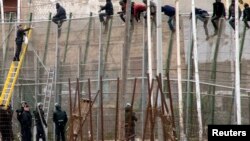Four years since the Arab Spring that swept away regimes elsewhere in north Africa, critics say Morocco is letting slide the freedoms King Mohammed promoted as a concession to the protesters of 2011.
The country's most influential human rights group has had to contend with new bans and restrictions in the last six months that activists see as a creeping campaign by the North African kingdom to crack down on its opponents again.
The group, known by its acronym AMDH, says harassment peaked after police raided its offices in downtown Rabat last month for the first time in its three-decade history to arrest two French journalists seeking refuge there.
One activist was beaten to the ground, AMDH says, before dozens of officers swarmed in to detain the journalists from television station France 3. Authorities said the two were working without authorization and later deported them.
“I walked back to our organization's office. The street and our building was full of dozens of police officers,” said AMDH's Rabiaa El-Bouzidi. “When I tried to pass through them to get into the office, they jumped on me, beat me and snatched the keys from my hands.”
Critics say the AMDH case illustrates a shift in the kingdom's approach on rights and protests previously treated with more tolerance.
Officials deny any violations, however, and say the government respects freedoms, asking only that rights organizations and journalists obey laws and regulations.
Formed by former political prisoners after a crackdown by the king's father Hassan II, the AMDH has a long history of tangling with the authorities. It now has hundreds of activists and around 90 regional bureaus, making it the biggest in the Middle East and North Africa.
Some say this is the toughest time the group has gone through.
“Since July nearly 62 meetings have been banned, and 13 regional bureaus have not received authorizations to renew their board in the last year,” AMDH's Abdelilah Benabdeslam said.
Mostapha Bouaziz, a historian from Casablanca University, said the will for political change appears to be wavering.
“Now it seems Morocco's political actors, including the palace and the opposition, are still hesitating on the path to modernity, even after the Arab Spring,” he said.
Politics reforms
In 2011, facing a wave of uprisings and protests for reforms at home, King Mohammed approved a new constitution devolving some of his powers to parliament and the government in unheralded political reforms.
With limited reforms, heavier public spending and tough state security measures, Morocco managed to calm the protests. The king also retained his grip on security, the army and religion.
But rights campaigners say the last six months have been one of the toughest periods in the history of the country's top rights association.
Mustapha Khalfi, Morocco's communication minister, dismissed the accusations. He said if some groups believe their rights have been violated, they can appeal to the justice system.
“We are an open country and we will remain open. We ask only for the respect of the law,” Khalfi said.
The tightening of control over AMDH appears, though, to coincide with a measured slowdown in political reforms.
The constitution guaranteed freedom of speech, and promoted other rights such as the strengthening up of an independent judiciary, and enshrining Amazigh as a national language.
Three years on, however, activists say progress has been limited. Morocco has curtailed the use of military courts for civilians, but activists point to the case of an editor who was jailed last year over his critical writing.
Authorities have also blocked scores of peaceful private and public meetings organized by various human rights associations, reversing a long-standing tolerance of such gatherings, the U.S. based Human Rights Watch said.
HRW said courts have also imprisoned demonstrators and outspoken government critics on the basis of repressive speech laws or following unfair trials.
“I think what is happening in Morocco shows well the limits of political liberalization,” Riccardo Fabiani at Eurasia Group said.
“While the authorities are willing to tolerate the activities of certain groups as long as they refrain from challenging the status quo, they are not ready to accept the activities which tend to highlight violations.”





